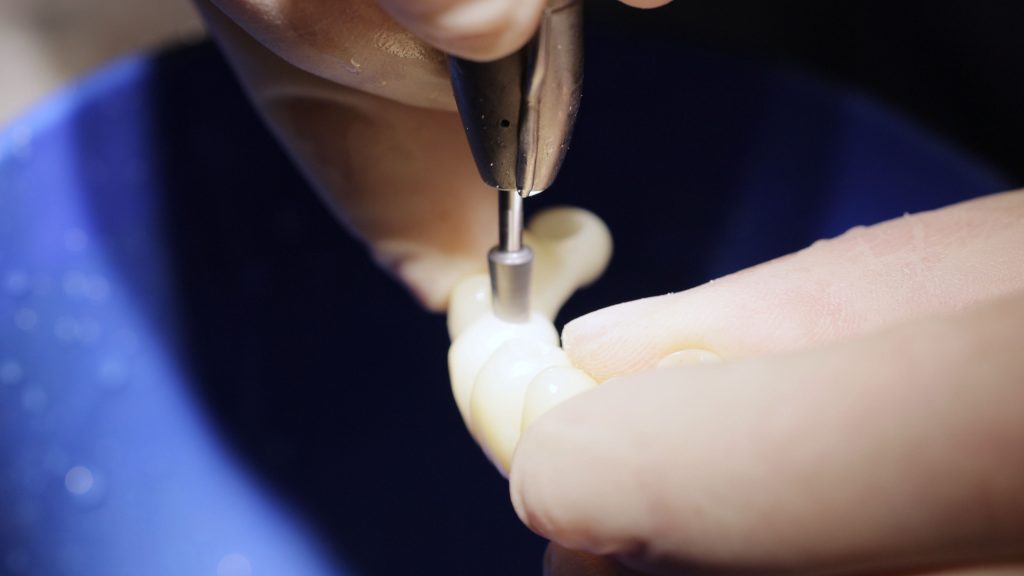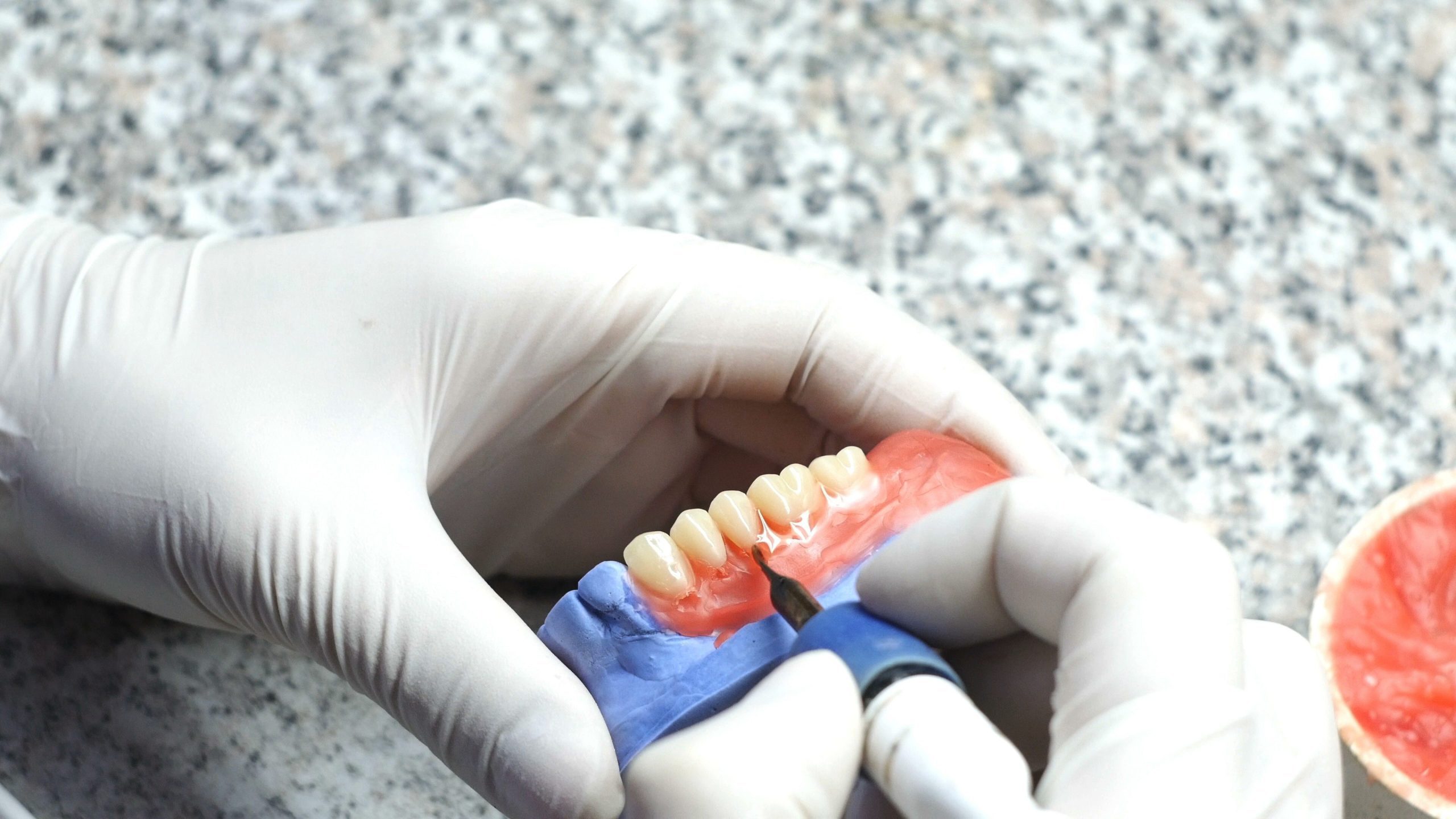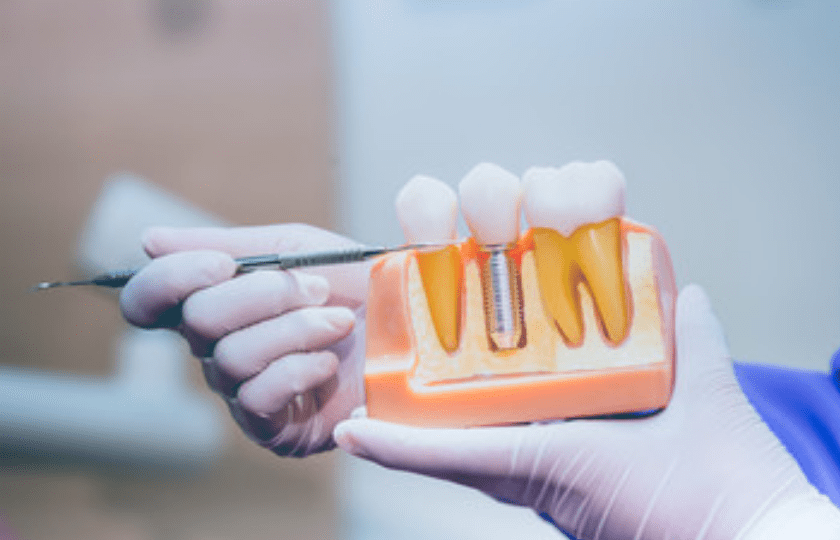A Guide to Dental Implants
Missing teeth don’t just affect your smile—they can impact your confidence, oral health, and overall quality of life. Thankfully, dental implants offer a durable, effective solution that restores not only your smile but also your ability to eat, speak, and live comfortably.
This guide provides a complete overview of dental implants, including their benefits, the process, costs, and care tips, so you can make an informed decision about whether they’re right for you.
What Are Dental Implants?
Dental implants are artificial tooth roots, typically made of titanium, that are surgically embedded into the jawbone. Once the implant is in place, a natural-looking crown or prosthetic tooth is attached to it, creating a sturdy and permanent replacement for missing teeth.
Unlike dentures or bridges, which rest on the gums or rely on adjacent teeth for support, dental implants integrate with your jawbone, mimicking the structure and function of natural teeth.

The Benefits of Choosing Dental Implants Over Other Options
Dental implants are considered the gold standard for tooth replacement, and for good reason. Here’s why they stand out compared to other alternatives like dentures or bridges:
- Natural Look and Feel: Implants look and function just like natural teeth, ensuring your smile stays seamless.
- Durability: With proper care, It can last for decades, offering a long-term solution.
- Preserves Jawbone Health: Implants help prevent bone loss, which often occurs after a tooth is lost.
- Improved Comfort: Unlike dentures, implants don’t slip or cause irritation.
- Easy Maintenance: You can care for implants the same way you would your natural teeth—brushing, flossing, and regular dental checkups.
Who Should Consider Getting Dental Implants?
While dental implants can be an excellent choice for many, they may not be suitable for everyone. Here are some factors to consider to determine if you’re a good candidate for implants:
- Good Overall Health: Since implants require minor surgery, it’s important to be healthy enough to undergo the procedure.
- Adequate Jawbone Density: A strong jawbone is necessary to support the implant. If you’ve experienced bone loss, procedures like bone grafting may help.
- No Untreated Gum Disease: Healthy gums are vital for successful implants. Gum disease should be treated beforehand.
- Non-Smoker or Willing to Quit: Smoking can affect the healing process and increase the risk of implant failure.
Consultation with a dental professional is essential to assess your specific situation.
The Dental Implant Procedure: Step-by-Step
Understanding the process can take away any uncertainty you may feel. Here’s what happens during a typical dental implant procedure:
- Initial Consultation: Your dentist evaluates your oral health, checks your bone density with X-rays, and determines if you’re a good candidate.
- Preparation: If necessary, preparatory treatments like tooth extraction or bone grafting are performed to ready the area for the implant.
- Placing the Implant: The titanium implant is surgically inserted into the jawbone under local anesthesia. You’ll then need a few months to heal, allowing the implant to fuse with the bone (a process called osseointegration).
- Attaching the Abutment: Once healed, a small connector piece called an abutment is placed on top of the implant.
- Placing the Crown: Finally, a custom-made crown, designed to match the color and shape of your surrounding teeth, is secured onto the abutment.
While the timeline varies for each patient, the entire process typically spans three to six months.
Note: For additional information, please refer to Wikipedia.
How Long Do Dental Implants Last?
Longevity is one of the standout benefits of dentures. With proper care, they can last 20 years or more—many even last a lifetime. Factors influencing their lifespan include oral hygiene, lifestyle habits, and regular dental visits.
Contrast this with bridges or dentures, which require replacement every five to ten years, and it’s clear why implants are a worthwhile investment.
Recovery and Aftercare: What to Expect
Recovery times vary depending on the individual and the complexity of the procedure, but here are some general aftercare tips to ensure optimal healing and implant success:
- Stick to Soft Foods: Eat soft foods like soup, yogurt, or scrambled eggs for the first few days after surgery.
- Maintain Oral Hygiene: Gently clean the area to prevent infection. Use a soft toothbrush and avoid harsh rinsing.
- Avoid Smoking: Smoking can delay healing and increase the risk of complications.
- Schedule Follow-Up Visits: Regular checkups are important for monitoring your healing progress.
Mild discomfort and swelling are normal after surgery but should subside in a few days.
Cost of Dental Implants: Factors to Consider
Dental implants are an investment, Several factors can influence the overall price, including:
- Number of implants needed
- Whether preparatory procedures (e.g., bone grafting) are required
- Type of implant materials used
- Location and experience of the dentist
While the upfront cost may seem high, the durability and benefits of implants often outweigh the expense over time. Many dental practices offer payment plans or financing options to make implants more accessible.
Common Myths About Dental Implants Debunked
- “Implants are painful.”
Most patients report minimal discomfort during and after the procedure, thanks to anesthesia and modern techniques.
- “I’m too old for implants.”
Age is not a limitation; overall health matters more than age. Seniors can benefit from implants just as much as younger patients.
- “Implants look unnatural.”
Implants are custom-designed to match your natural teeth, making them virtually indistinguishable.
- “Caring for implants is complicated.”
Implant care is as simple as maintaining your natural teeth—just brush, floss, and visit your dentist regularly.
How to Care for Your Dental Implants for Longevity
To keep your implants in great shape, follow these best practices for daily care:
- Brush twice a day with a soft-bristle toothbrush.
- Use floss or interdental brushes to clean around the implant.
- Avoid biting into hard objects (e.g., ice or hard candy).
- Schedule biannual dental cleanings to check on the health of your implants and surrounding gums.
- Stay proactive in treating any oral health concerns promptly.
With consistent care, your implants will stay strong, secure, and as beautiful as the day they were placed.
Dental implants don’t just replace missing teeth—they restore your confidence, oral health, and quality of life. Whether you’re missing one tooth or several, implants offer an unparalleled solution to bring back your natural smile.
Curious to learn more or ready to take the next steps? Schedule a consultation with your dentist today to explore how implants could transform your life.
FAQ`s
- How long do dental implants last?
Implants can last a lifetime with proper care and maintenance, as they are a permanent solution for missing teeth.
- Are dental implants painful?
Most patients report minimal discomfort during and after the procedure, as local anesthesia is used and post-operative pain is manageable with prescribed medications.
- Can anyone get dental implants?
While most healthy adults can be candidates for dentures, a thorough examination and consultation with a dentist is necessary to determine eligibility.
- How much do dental implants cost?
The cost of dental implants can vary based on factors such as the number of implants needed, the materials used, and any additional procedures required. In general, prices can range from $3,000 to $5,000 per implant.
- What are the benefits of dental implants?
Dental implants provide a number of benefits, including improved aesthetic appearance, restored functionality for chewing and speaking, preserved bone structure, and no risk of surrounding teeth being affected.
If you’re ready to restore your smile with dental implants, Progressive Dental Group in Ramsey is here to help. Our experienced team and advanced technology ensure a seamless and comfortable experience from start to finish.
Contact us today to schedule your consultation and take the first step toward a confident, healthy smile!


